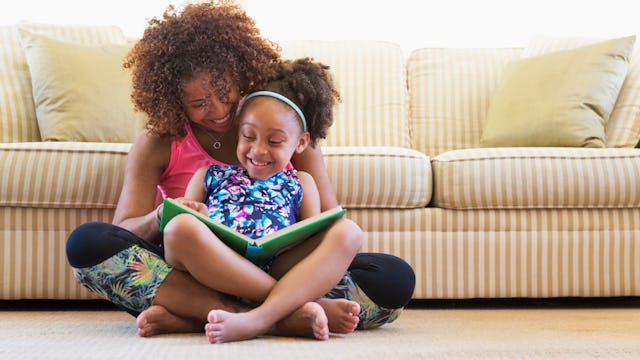Print Books Are Better Than Tablets When You're Reading To Your Toddler

Print is definitely not dead when it comes to reading books with your toddler
After ebooks raged in popularity over the last decade, we’ve recently seen the trend slow down slightly, with hard copy book sales rising again since 2017. Still, ebooks brought in $771 million during the first nine months of 2018, and a significant portion of those sales were children’s books. But a new study has found that while ebooks may be convenient and beneficial for adults, kids still benefit more from readying hard copy print books with their parents.
The study, which was published in the journal Pediatrics this week, found that while reading to toddlers is always a good thing, reading to them from print books results in a better, more engaging experience for both kids and parents.
The research, which was conducted by Dr. Tiffany Munzer, a fellow in development behavioral pediatrics at the University of Michigan C.S. Mott Children’s Hospital, observed 37 pairs of parents and children reading Little Critter stories for five minutes. They were given either traditional print books, regular ebooks, or ebooks with extra sounds and visual effects. Researchers then tallied the number and type of engagements the pair had while reading the book, such as pointing, questions, and exploring the page.
The findings? The print books encouraged the most story-related interactions, from asking questions about the plot, to non-verbal bonding. The pairs also got farther into the story when reading from a traditional book. On the other hand, the ebooks were more distracting, and interactions tended to be about how the device worked – swiping and button-pressing.
“The print book is really the gold standard in eliciting positive interactions between parents and their children,” Munzer told ABC News. “Our goal with some of the kinds of findings in the study is not to make things harder for parents, but to help them focus on activities that spark interactions with their children where they feel that back-and-forth is really easy.”
The ebooks with added bells and whistles fared even worse. In these cases, they took away from the creative telling of the story – with the print books, the parents and children often provided their own sounds and embellishments. They weren’t just distractions, they took away imaginative moments from the pairs.
“The print book is a really beautiful object in that each parent and child interacts differently over a print book,” said Dr. Munzer. “Parents know their children well and have to make it come alive for their child to create that magic.”
Another problem? The tablet caused more negative interactions.
“The tablet is designed to be more of a personal device, perhaps parents and children use it independently at home,” Munzer told the New York Times. The result was struggles over who got to hold the tablet and comments like, “Don’t touch that button!”
This is far from the first study that has found that books are better than screens when it comes to kids’ consumption of stories. Generally, scientists have found that digital input can be too much for kids’ brains to process, while stories in books allow them not only to process the story more easily, but to add their own thoughts and have their own feelings about it. At the same time, screens discourage parent-kid interaction and learning, while reading aloud encourages it.
Of course, this doesn’t mean you should throw your kid’s tablet in the trash, or stop reading to them on their tablet. Tablets come with their own benefits, too. They don’t take up shelf space, they make buying new books easy, and they’re great to travel with. They can also be more convenient and allow younger kids to read without their parents’ help. Just realize that if you have the choice, picking up a hard copy of a book with your kid is less distracting and leads to a more meaningful and story-focused parent-child interaction.
Also, it’s important to note that all reading you do with your kid is beneficial to their development – not just their reading and writing skills, but also their social and emotional growth. One mistake parents may make is letting even very young kids “read” on their tablet alone, but so many benefits of reading come from the one-on-one time parents spend with their kids, learning about the world together and experiencing stories together. But the bottom line? Reading of any kind is absolutely great for kids, and reading print books is likely even better.